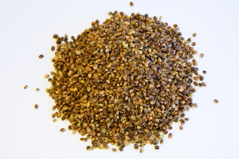Hemp
Hemp is a vastly useful plant both nutritionally and otherwise. Leaves, seeds, and oils of the plant are all edible and nutrient dense. Hemp seeds are one of the most nutritionally complete foods available. They can be sprouted, soaked, or eaten as is.
Hemp is commonly sold as a powder, either on its own, or mixed in with other super foods or protein powders. Hemp seeds are difficult to find in grocery stores in the U.S. due to agriculture laws, but can often be found online.
| Region: |
Canada, Germany, China, and the Philippines |
Health Benefits
Nutrients
| Calcium |
N/A |
N/A |
|
| Copper |
N/A |
N/A |
|
| Fats |
N/A |
N/A |
Hemp oil and seeds are both good sources of polyunsaturated fat. |
| Iodine |
N/A |
N/A |
|
| Iron |
N/A |
N/A |
|
| Magnesium |
N/A |
N/A |
|
| Manganese |
N/A |
N/A |
Found in the seeds. |
| Omega-3 Fatty Acids |
N/A |
N/A |
Contains a healthy ratio of omega-3 to omega-6 fatty acids. |
| Omega-6 Fatty Acids |
N/A |
N/A |
Contains a healthy ratio of omega-3 to omega-6 fatty acids. |
| Omega-9 Fatty Acids |
N/A |
N/A |
|
| Phosphorous |
N/A |
N/A |
|
| Potassium |
N/A |
N/A |
|
| Protein/Amino Acids |
N/A |
N/A |
A good source of protein when eaten as a seed or in protein powder form. Unlike other protein sources, people have not been found to be allergic to hemp protein. Hemp contains no trypsin inhibitors, which sometimes interfere with protein digestion of other seeds. |
| Silicon |
N/A |
N/A |
Use the hemp leaves. |
| Sulfur |
N/A |
N/A |
Found in the unsprouted seeds. |
| Zinc |
N/A |
N/A |
|

